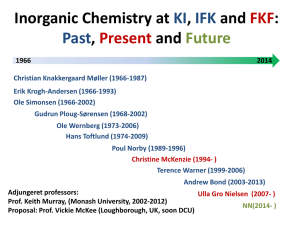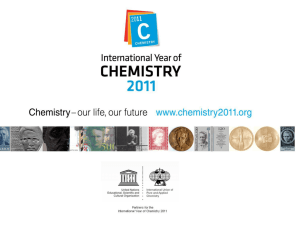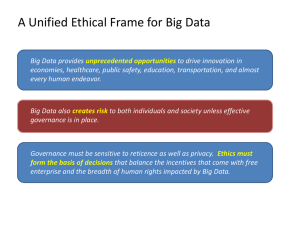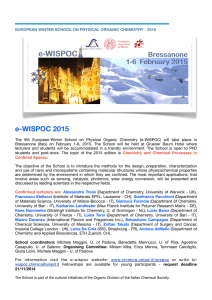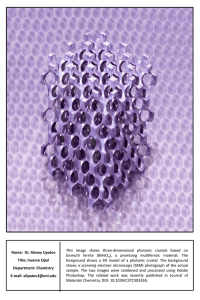Evaluation of Bachelor/Master in Business/Chemistry
advertisement
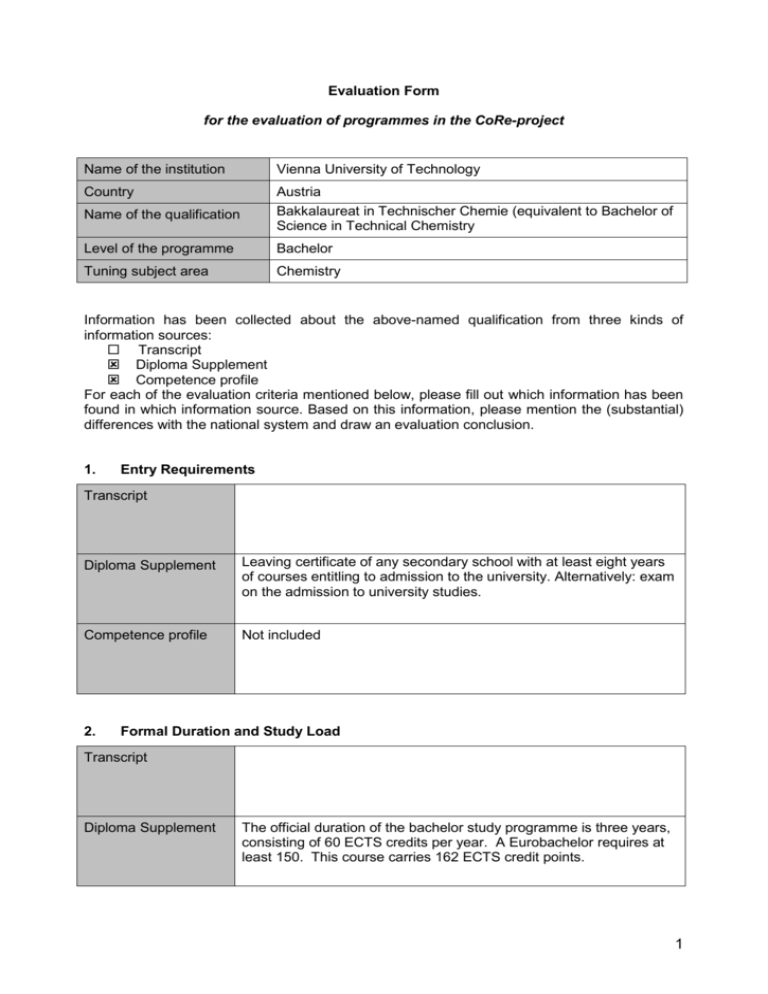
Evaluation Form for the evaluation of programmes in the CoRe-project Name of the institution Vienna University of Technology Country Name of the qualification Austria Bakkalaureat in Technischer Chemie (equivalent to Bachelor of Science in Technical Chemistry Level of the programme Bachelor Tuning subject area Chemistry Information has been collected about the above-named qualification from three kinds of information sources: Transcript Diploma Supplement Competence profile For each of the evaluation criteria mentioned below, please fill out which information has been found in which information source. Based on this information, please mention the (substantial) differences with the national system and draw an evaluation conclusion. 1. Entry Requirements Transcript Diploma Supplement Leaving certificate of any secondary school with at least eight years of courses entitling to admission to the university. Alternatively: exam on the admission to university studies. Competence profile Not included 2. Formal Duration and Study Load Transcript Diploma Supplement The official duration of the bachelor study programme is three years, consisting of 60 ECTS credits per year. A Eurobachelor requires at least 150. This course carries 162 ECTS credit points. 1 Competence profile 3. Not included Structure and Contents Transcript Diploma Supplement Competence profile Mathematics for Chemists I Mathematics for Chemists II Physics I + II Fundamentals of Chemistry Analytical Chemistry I Analytical Chemistry II Analytical Chemistry Laboratory Course Inorganic Chemistry I Organic Chemistry I Physical Chemistry I Solid State Chemistry Analytical Chemistry III (a+b) Inorganic Chemistry II Organic Chemistry II Synthetic Chemistry Laboratory Course, including Structural Elucidation Physical Chemistry II Physical/Physico-chemical Lab Course1) Biochemistry I Biotechnology I + Biochemistry PS Mechanical Engineering Chemical Engineering Chemical Technology of Inorganic Materials Instrumental/Bioanalytical Laboratory Course Thermal Process Engineering Chemical Engineering Laboratory Course Chemical Technology of Organic Materials Laboratory Course Chemical Technology of Inorganic Materials, including Solid State Chemistry Technical Electrochemistry Biotechnology Laboratory Course Laboratory Course Chemical Technology of Organic Materials Soft skill courses or elective courses Bachelor thesis work including seminar and presentation Chemistry based Practical Skills The total number of credits allocated to pure practical course units 71 ECTS (this includes the Bachelor thesis). Lab work is undertaken throughout the three years. In the first year there is an ‘Analytical Chemistry Laboratory Course’. The second year has ‘Synthetic Chemistry Laboratory Course, including Structural Elucidation’ and ‘Physical/Physico-chemical Lab Course’ module. The final year has 2 ‘Laboratory Course Chemical Technology of Inorganic Materials, including Solid State Chemistry’, ‘Biotechnology Laboratory Course’ and ’Laboratory Course Chemical Technology of Organic Materials’. These sessions provide a hands-on learning environment, which is an essential part of the course. Lab sessions are conducted under supervision, typically in groups of 10 students or less. 4. Formal Rights Transcript Diploma Supplement N/A Competence profile N/A 5. Function of the Programme Transcript Diploma Supplement The curriculum creates a basis for any master programme in chemistry, chemical technology or any other natural/technical science master curriculum, or Competence profile The qualification allows graduates to enter the market early with their bachelor qualification. 6. (Substantial) Differences with UK system There are no substantial differences between this degree and a UK degree in Chemistry. 3 7. Evaluation Conclusion This degree would be considered comparable to a British Bachelor degree in Chemistry 4 Analysis Form for the evaluation of the competence profile The main goal of the CoRe-project is to evaluate the value of a competence profile for the purpose of international recognition of foreign qualifications. In order to evaluate the competence profile of this particular qualification, please answer the questions below. 1. Does the competence profile contain relevant additional information? (which could not be found in the transcript and/or Diploma Supplement) This is a 69 page document detailing the make up of the Eurobachelor. It is a self assessment report, and although following a defined structure it does not conform to a Diploma Supplement. It presents a great deal of information about the course content, the objectives / outcomes of the course, the teaching methods and the way the course is assessed. 2. Are the formulations of competences clear, brief and specific? The competences included within this document are well structured, clear and link directly to the appropriate units. Competence targets for a Bachelor in Chemistry Evaluation comments Chemistry related competencies Major aspects of chemical terminology, nomenclature, conventions and units (3.1) The major types of chemical reaction and the main characteristics associated with them (3.1) The principles and procedures used in chemical analysis and the characterisation of chemical compounds (4.1; 4.3) The principal techniques of structural investigations, including spectroscopy (4.2; 4.3; 4.4; 4.5; 6.3; 8.1) The characteristics of the different states of matter and the theories used to describe them. (3.1; 7.1; 7.3) The principles of thermodynamics and their 5 applications to chemistry (7.2; 7.3) The principles of quantum mechanics and their application to the description of the structure and properties of atoms and molecules (7.2; 7.3) The kinetics of chemical change, including catalysis; the mechanistic interpretation of chemical reactions (7.2; 7.3) The characteristic properties of elements and their compounds, including group relationships and trends within the Periodic Table (5.1; 6.3) The structural features of chemical elements and their compounds, including stereochemistry (5.2; 6.3) The properties of aliphatic, aromatic, heterocyclic and organometallic compounds (6.1; 6.3) The nature and behaviour of functional groups in organic molecules (6.2; 6.3) Major synthetic pathways in organic chemistry, involving functional group interconversions and carbon-carbon and carbon-heteroatom bond formation (6.2; 6.3) The relation between bulk properties and the properties of individual atoms and molecules, including macromolecules (both natural and man-made), polymers and other related materials (8.1; 12.2; 12.3; 12.4; 12.7) The structure and reactivity of important classes of biomolecules and the chemistry of important biological processes. (4.5; 10.1) Generic competencies Problem-solving competences. Practical application of knowledge acquired. Numeracy and general calculation skills. error analysis, order-of magnitude estimations, and the correct use of units. Information management competencies, in particular computer literature search and information retrieval. Ability to analyse material and synthesise concepts. The capacity to adapt to new situations and to make decisions. Information-technology skills such as wordprocessing and spreadsheet use, datalogging and storage, subject-related use of the Internet. Skills in planning and time management. Interpersonal skills, relating to the ability to interact with other people and to engage in 6 team-working. Communication competences. Good communication skills in at least one other of the major European languages. Study competences, including the preparation for life-long learning. Ethical commitment. Ability to evaluate and compare different chemical processes with regard to their industrial application (e.g. from an economical, environmental, or legal point of view). 3. What information is missing in the competence profile? It is unclear as to where students gain their knowledge to be able to compare different chemical processes from different perspectives (e.g. from an economic, environmental, or legal point of view). Also the self assessment does not contain the summary of the course I would expect; this information was in the Competence Profile – this was very useful. Entry requirements Formal duration and study load 4. Does the information in the competence profile give you a better understanding of the level and content of the programme? Yes it does. It provides a great deal of information about the course and level of the qualification as well as detailing the specific outcomes that an employer and / or institution should expect from a graduate of this course. 5. Does the information in the competence profile affect your evaluation conclusion? No. 7 6. Please give your comments and/or recommendations for the improvement of the competence profile for recognition purposes. The Eurobachelor self assessment report is very detailed, and perhaps covers a lot of information, that employers and institutions may feel is superfluous to their requirements. It would be very useful to have a single clear statement detailing the objectives of the course and the key competencies that the student will have once they have completed the qualification. 8
